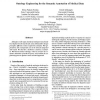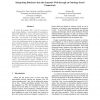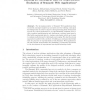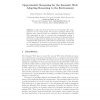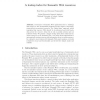SEMWEB
2004
Springer
14 years 6 months ago
2004
Springer
Abstract. Magpie is a suite of tools supporting a ‘zero-cost’ approach to semantic web browsing: it avoids the need for manual annotation by automatically associating an ontolo...
ECAI
2004
Springer
14 years 6 months ago
2004
Springer
This paper presents an architecture that helps users to collect and qualify meta-information about web resources within a weblog and then share them with a group of people. Our arc...
ESWS
2005
Springer
14 years 6 months ago
2005
Springer
In a real world scenario Semantic Web applications must be capable to cope with the large scale, distributed, heterogeneous, unreliable and insecure environment of the World Wide W...
DEXAW
2005
IEEE
14 years 6 months ago
2005
IEEE
Although a wide range of medical ontologies has already been deployed in the last decade, most of them follow design principles different to those required by Semantic Web applica...
ICDE
2006
IEEE
14 years 6 months ago
2006
IEEE
To realize the Semantic Web, it will be necessary to make existing database content available for emerging Semantic Web applications, such as web agents and services, which use on...
SOFSEM
2007
Springer
14 years 6 months ago
2007
Springer
The increasing number of Semantic Web applications that work with ontologies implies an increased need for building ontological knowledge bases. In order to improve ontologies duri...
SEMWEB
2007
Springer
14 years 6 months ago
2007
Springer
In this paper, we present a brief overview of Falcon-AO (version 0.7): a practical ontology matching system with acceptable to very good performance, a flexible architecture, and ...
SEMWEB
2007
Springer
14 years 6 months ago
2007
Springer
Despite the efforts devoted so far, the Semantic Web vision appears to be an eluding target. We propose a paradigm shift for the Semantic Web centred around the pragmatics of deve...
SEMWEB
2007
Springer
14 years 6 months ago
2007
Springer
Developers of Semantic Web applications face a challenge with respect to the decentralised publication model: where to find statements about encountered resources. The “linked d...
ESWS
2007
Springer
14 years 7 months ago
2007
Springer
Developers of Semantic Web applications face a challenge with respect to the decentralised publication model: where to find statements about encountered resources. The “linked d...

